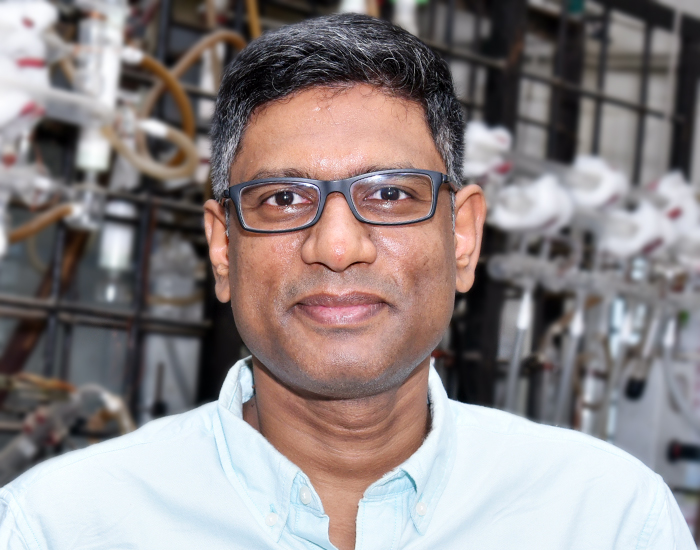
Sabuj Kumar Kundu
PhD (Rutgers University)
Professor, Department of Chemistry
Research Interest
Organometallic Chemistry, Catalysis and Mechanistic Investigation, C-X (X= H, C, O, etc.) Bond, Activation and Functionalization, Renewable Energy and Green Chemistry
FB 404,
Department of Chemistry
IIT Kanpur,
Kanpur 208016
Specialization
Catalysis and Organometallic Chemistry
Education
PhD (2009), Rutgers University, USA.
M. Sc. (2004) IIT Bombay.Thesis Title: Reactions of (PCP)Ir Complexes with Small MoleculesThesis Supervisor:Prof. Alan S. Goldman
Selected Publications
Awards & Fellowships
Professional Experience
Assistant Professor, IIT Kanpur, 2013-.
The University of North Carolina at Chapel Hill, Postdoctoral Fellow, 2011-2013
University of Rochester, Postdoctoral Fellow, 2009-2011
Current Research
There has been growing interest in synthesis and catalytic activity studies of water soluble transition metal complexes in past two decades. Water as a solvent has many potential advantages over organic solvents such as it is environmentally friendly, cheap, and easy to separate from organic products. We are interested to investigate synthesis and catalytic activities of new water soluble transition metal complexes in many catalytic transformation such as reduction of carbon dioxide to formate/formic acid, hydrogenation of ketone, aldehyde and alkene etc. CO2 hydrogenation to formic acid is not energetically favourable although it is an exothermic reaction due to unfavourable entropy conditions. Water as a solvent will play an important role in this transformation, as it will strongly influence the entropy difference by solvation of both reactants and products. Concentration of CO2 in the atmosphere dramatically increased in past few decades due to industrial revolution and growing demand for energy. There has been a great deal of interest to address this issue by utilization of CO2 as feedstock in recent years due to its non-toxicity, high abundance, and attractive potential for renewable source. However, trans-formation of CO2 is challenging due to its high thermodynamic and kinetic stability. We are interested in many different approaches in transformation of CO2 to useful chemicals. C-H bond activation and functionalization, catalyzed by transition metal complexes received a great deal of interest in past two decades. Selective transformation of readily available organic compounds to useful organic substrates by functionalization of inert C-H bond has tremendous potential value for synthesis of fine chemicals. Big questions in sp3 C–H bond activation field still remain to be solved are: 1. Is it limited to few expensive transition metal complexes (e.g. Ir, Rh, Pt etc.)? 2. How to selectively functionalize sp3 C–H bond to C-O, C-C, C-N, C-X (X= halogen)? 3. How to improve stability, catalytic activity and functional group tolerance (e.g. –CN, -NO2, -CO2R etc.) of the catalysts? To answer these questions we are interested in developing new synthetic strategies/methodologies for C-H bond activation and functionalization using Ru, Os, Co and Fe catalysts. Selective and efficient transformation of biomass feedstock to sustainable chemicals and fuels is one of the major focuses in renewable energy to reduce dependence on petroleum based resources. Our research will focus on synthesis of water soluble, thermally robust metal complexes and extensive studies of these complexes for application in biomass and biomass related conversion by hydrogenolysis and deoxygenation.



